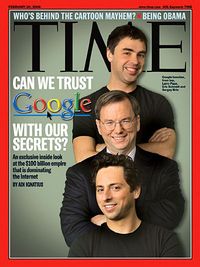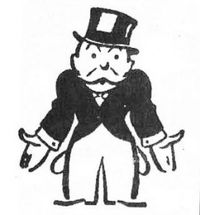
That said, capitalism by itself sucks. As an –ism, rather than just a way of structuring the economy, capitalism has a fatal flaw.
Capitalism has yet to figure out what to do when the game ends. And the game is always ending.
Think about it. Capitalism means competition. There are winners, and there are losers. Over time there are more and more losers, fewer and fewer winners. That’s how games work. Adam Smith wrote that capitalists would be inclined toward the common good, and some are. But others are not. “Rich man want to be king, and a king ain’t satisfied until he rules everything,” as Bruce Springsteen sang in “Badlands.”
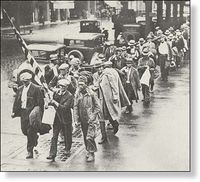
What happened in 1914? World War I, which decimated the ultra-wealthy, reducing their share of national income. What happened in 1929? The Great Depression, Hitler, World War II, the “great compression” that brought the wealthy’s share of national income to its lowest level by the mid-1950s.
What happens when the rich get too much money is that some decide to turn that into power over other people. They build enormous arsenals for “defense” and then use them against other arsenals.

What is commonly derided by the Right as “democratic socialism” is, in fact, merely a continuing effort to address this crisis, and it’s something we’ve been doing since the Founding. Alexander Hamilton’s “Bank of the United States,” so derided by Jefferson, was the first shot in this argument. DeWitt Clinton’s Erie Canal, an enormous piece of government-backed infrastructure, was followed by Abraham Lincoln’s land grant colleges, Homestead Act, and Pacific Railway Act (he started out as a Whig) all designed to not just create wealth, but spread it around, to recycle it.
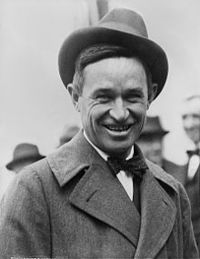
All such thoughts are derided by conservatives today as “socialism,” against which they offer “capitalism,” turning the search for individual wealth into a system of government, something it was never meant to be. Capitalism, as a system of government, turns out to not only be bad for the poor, and the middle class, but for the wealthy as well. The evidence on this is clear. Only a capitalist, an idiot, or an idiot in the pay of capitalists can argue with it.
Government – democratic government that promotes ordered liberty — is the only force that can prevent wars of choice, allowing wealth to trickle up, growing the economy so we have the capital needed to terra-form Earth, which is the 21st century’s great challenge. You may choose to call it “socialism,” but it was described nicely in the Declaration of Independence, which was written the same year as Adam Smith’s “Wealth of Nations”:
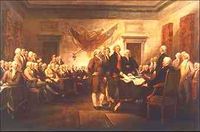
Absolute control of government by capitalists, or by any other force antithetical to liberty and justice, is thus the only excuse there is for revolution. And if the Koch brothers get their way, that will inevitably follow, a violent revolution that will throw everyone’s wealth – that of the poor, the middle class, even the Kochs’ – onto the fire, and transform the United States into just another Latin despotism.
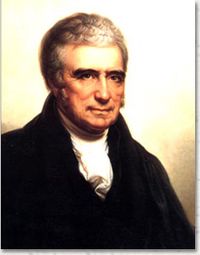
As a corollary to the Constitution we like to talk about “Equal justice under law,” a phrase etched in stone above the Supreme Court building, and placed into the law mainly by Chief Justice John Marshall, a Federalist appointed by John Adams in opposition to incoming President Jefferson. It is an ideal from Greek antiquity which means that everyone is equal under it. But there’s a corollary. Anyone who claims to be above the law becomes the law. How much license they grant themselves, and how much liberty they deign for you to have, then becomes something wholly under their control.
There’s no absolute here. I’m sure you can easily tell me a half-dozen actors, corporations, or religious figures who you feel arbitrarily place themselves above the law today, who flout its designs today, who ignore it today, and who act entirely based on their own concept of license, putting others’ liberty under check. Neither democratic government nor the concept of liberty are absolutes. They’re goals, the “more perfect union” Lincoln talked about. The union can always be made more perfect. The general welfare can always be improved, government has the right to do that, and it has exercised that right ever since the Constitution was written.
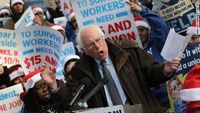
So get involved, now. Vote. Work. Run for something. It’s not only your right, it’s your duty, not only to protect your rights but to meet capitalism’s unmet challenges, and to keep it from throwing the rich on a bonfire of their own vanities.


